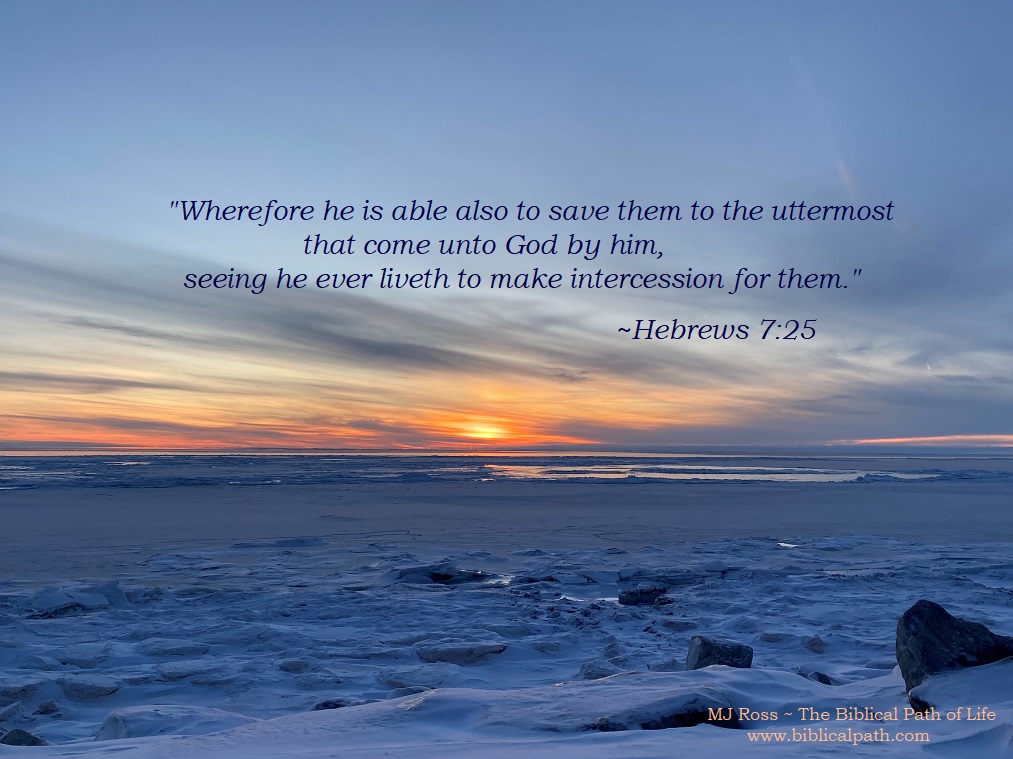
“Wherefore he is able also to save them to the uttermost that come unto God by him, seeing he ever liveth to make intercession for them.”
Hebrews 7:25
Stephen was one of the seven men chosen who stood out in his service to God (see Acts 6:8). Christians have learned that when God begins to work, Satan likes to stir trouble against them. “Then there arose certain of the synagogue … disputing with Stephen” (Acts 6:9). The religious leaders confronted Stephen. However, see what we can understand. “And they were not able to resist the wisdom and the spirit by which he spake” (Acts 6:10). The religious leaders may not have received the truths that Stephen taught about faith in Jesus, but they could not refute those truths either. Understand what the religious leaders did instead. “Then they suborned men, which said, We have heard him speak blasphemous words against Moses, and against God” (Acts 6:11). Suborned means “to introduce underhandedly; to make a secret agreement; to suborn in the legal sense means to induce a person to make a false oath; to commit perjury.” They set up false witnesses who erroneously accused Stephen. Stephen was brought before the council (see Acts 6:12-13).
Stephen preached to them. He reminded them of their history from the Old Testament Scriptures. In his teachings, he offered to the religious leaders a bold defense of the Christian faith (Jesus). In his remembrance, he made it a point to remind them of something that occurred throughout their history. See if you can understand the thought that he seemed to be presenting.
God called Abraham to leave his home and family (see Acts 7:2-5). Abraham left the land of the Chaldeans, but he did not enter the land he was supposed to enter into at first. He waited until his father died. Then he finally went where God sent him.
Joseph understood God would one day make him a ruler, yet his brothers rejected him – at first (see Acts 7:9-15). It was not until after his brothers had sold him into slavery, Joseph became a prisoner, and was finally lifted up as the second ruler over the land of Egypt that his brothers accepted him as their ruler.
Moses believed he was to deliver his fellow Israelites while in Egypt (see Acts 7:17-36). However, when he tried to help one who was suffering a wrong, Moses avenged him and smote the Egyptian. The people refused him as their leader, and Moses went to Midian for forty years until God called him from the “flame of fire in a bush” (Acts 7:30). Moses returned to Egypt. “This Moses whom they refused, saying, Who made thee a ruler and a judge? the same did God send to be a ruler and a deliverer by the hand of the angel which appeared to him in the bush” (Acts 7:35). Did you notice that the people refused Moses at first, but God sent him a second time? God used Moses to deliver His people from Egypt. Remember: Joseph was initially rejected by his brothers, and Moses was initially rejected by his people. Even though both of these men were rejected at first, when God gave His people a second chance, these men were received as leaders. It was then that these men were able to save God’s people in their time of history.
It is here one can understand that Stephen made an observation. “This is that Moses, which said unto the children of Israel, A prophet shall the Lord your God raise up unto you of your brethren, like unto me; him shall ye hear” (Acts7:37). Moses had told them of a Prophet who was to come, and that Prophet was Jesus.
Stephen went on to remind them of God’s Law that they said they would keep, yet they broke. He reminded them that they refused to allow Moses to lead them into the Promised Land, and yet God allowed Joshua to lead them there.
It sounds as if Stephen was trying to make the point: that God’s people often failed the first time.
Although there was never a time that the entire nation worshiped God, there was always a remnant of true Believers. Yet as Stephen reminded the religious leaders of these great men of their history, these religious leaders (who knew the history in the Old Testament) had rejected the greatest Deliverer presented to them – Jesus. For Jesus had come to “… save His people from their sins” (Matthew 1:21). Stephen rebuked these religious leaders for their unbelief. Remember, it was some of these same religious leaders who had not only rejected Jesus, but had demanded His death (see Acts 7:52). Do you think Stephen might have been just about to tell them that they, too, had a second chance to believe upon Jesus? The Scripture teaches: “Wherefore he is able also to save them to the uttermost that come unto God by him, seeing he ever liveth to make intercession for them” (Hebrews 7:25).
Yet what did the religious leaders do before Stephen could say anymore? “When they heard these things, they were cut to the heart, and they gnashed on him with their teeth” (Acts 7:54). They were “cut to the heart.” These religious leaders had studied the Old Testament Scriptures, yet they had not believed the words recorded therein. They had rejected Jesus, the One of whom it was all written. In essence, they rejected their “second chance.” Instead of repenting and turning to Jesus (as many people had done), they ran upon Stephen (only the messenger) and bit him with their teeth. They then killed Stephen.
However, when Jesus returns one day, then the Israelite people will believe.
Do you understand that God will give a second chance to one who initially may have rejected His call?
Leave a Reply